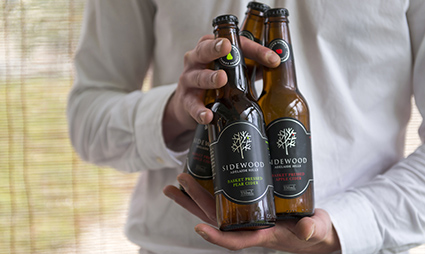Australian Adelaide Hills cider maker has installed a new canning line as it prepares to exploit the low sugar edge it has over its rivals
Sidewood, which also produces a range of wines, has been making cider since 2014 and has established the canning line at its Nairne winery as part of its philosophy of maintaining control of the process from start to finish.
 Sidewood, which also produces a range of wines, has been making cider since 2014 and has established the canning line at its Nairne winery as part of its philosophy of maintaining control of the process from start to finish.
Sidewood, which also produces a range of wines, has been making cider since 2014 and has established the canning line at its Nairne winery as part of its philosophy of maintaining control of the process from start to finish.
Previously under glass, the first commercial cans of Sidewood’s apple and pear ciders are expected to roll off the line in the coming weeks.
The small-scale Cask Brewing System, from Canada, can fill about 3000 cans an hour and is scalable to allow for expansion of Sidewood’s current target of 10,000 cases a year.
The fruit for the cider is sourced from Lenswood Apples, an Adelaide Hills co-operative with a growing global reputation.
Sidewood owner Owen Inglis said demand for cider in recent years, the similarities between wine and cider making and their location within an apple growing region made the decision to add cider to the wine list easy.
“Basically there was an opportunity and there’s some fantastic fruit here,” he said.
Sidewood also juices its own apples and pears rather than buying virgin juice.
Inglis said this helped maintain consistent high standards because it “allows us to eyeball the quality of the fruit”.
He said Sidewood would begin marketing its ciders as “no added sugar” after testing at a cider certified lab in Victoria found their pear and apple ciders to be significantly lower in sugar than all of the other 17 market leading brands to be tested.
“Cider ferments quickly so we’re very careful about stopping the ferment when sugar and alcohol levels are where you want them, which is exactly what you do with wine, so we’re not adding back any sucrose at all. It’s a very natural product. “We’ll be marketing that ‘no added sugar’ quite hard.”
Inglis said while there were advantages around freshness and shipping, cost was the main motivation for going from glass to cans with the cider.
“Bottling is very expensive in this country so the craft beer producers are going into cans – a lot of them with this same Canadian system we are operating on,” he said.
“The price of juicing apples is so low that it doesn’t make commercial sense as a commercial producer,” Inglis said. “We are planting right now a number of different varieties but it will just be very small batches and not commercial.”









